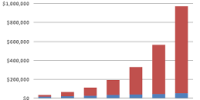Deferred interest is a deal on what is effectively a loan that allows the borrower to postpone paying interest for a fixed period of time if the loan is paid in full or the expense of a particular item is paid in full. However, the obligation to pay the interest is merely deferred, not eliminated. On the off chance that the borrower doesn’t take care of the advance equilibrium before this period closes, at that point revenue charges begin gathering. Tragically, numerous individuals don’t understand that on the off chance that they don’t take care of their buy-in full before the conceded interest time frame closes, the entirety of the amassed interest will be added to their charge card balance.
Mortgages with deferred interest, also known as deferred interest mortgages or graduated-payment mortgages, are also accessible. When it comes to expensive items like vehicles, furniture, and home appliances, this form of deal is common. When the terms “same as cash” or “no interest loan for 12 months” are used, the borrower may recognize deferred interest. They’ll note an increase in these deals during the holidays, as retailers try to get customers to spend more on presents and pay for them later. Interest charged on a loan may also be backdated to the entire loan balance, including high-interest rates.
A deferred interest bargain is a path for the items’ providers to bait clients into accepting they are getting a more ideal arrangement since interest costs are retained for a specific measure of time. Deferred interest advances are ordinarily found on credit cards or offered by retailers. Mortgages can also include deferred interest options, in which accrued interest is applied to the loan’s principal balance, a process known as negative amortization. If the borrower or buyer does not pay off the entire loan balance within the promotional, “interest-free” period, however, interest costs begin to accrue.

Deferred interest financing isn’t exactly the same thing as sans interest and it’s not exactly the same thing as a 0 percent introduction APR credit card. With a conceded revenue charge card, the premium starts to accumulate from the start of the credit. By and large, deferred interest credits are not viewed as a monetarily reasonable methods for financing. Deferred interest has a number of drawbacks, including retroactive interest payments, secret fines, and exorbitant interest rates. On large-ticket products like furniture and home appliances, retailers often offer deferred interest options.
The Biggest Issues with Deferred Interest Deals:
When people pay off their purchases in full and on time, they benefit from an interest-free period. People can potentially pay more than they would have with a certain form of loan or credit card if they don’t. Some of the drawbacks of deferred interest loans are listed below:
- Retroactive charges: The company, the supplier, and the terms of the contract all influence retroactive charges. If the principal balance on a loan or the amount due on an object is not paid off during the deferred interest period, retroactive interest fees can be applied to the amount owed, requiring the borrower to pay the entire interest charges for the deferred interest period.
- Technicalities: People who don’t read the fine print carefully risk losing out on an interest-free bid. One missed payment, for example, could result in the deal being terminated, requiring them to pay all of the interest they had hoped to prevent.
- Things change: There is no such thing as a 100 percent predictable life. Unexpected events often cause people to divert funds to something else, possibly resulting in deferred interest loan payments being skipped. According to a survey, roughly 20% of all customers miss the deadline. Fewer than half of subprime borrowers met the deadline, resulting in the payment of deferred interest.
- High-interest rates: When it comes to deferred interest loans, the interest rate is usually high, often about 20% or more. Even if a person pays off their debts during the promotional time, the interest rate will be high in the future. The debt could cripple or bankrupt the creditor if retroactive interest is applied.
Deferred interest alternatives generally keep going for a particular timeframe where no interest is charged. When this period is finished and on the off chance that the credit balance has not been paid, premium charges begin building, some of the time at high rates. Deferred interest bargains are famous on charge cards also. It’s yet another ploy to entice customers to sign up for a credit card company’s card. The card will often advertise a “no interest” offer when, in fact, it is merely deferring interest for a fixed period of time.
People who wish to take advantage of a no-interest credit card must pay off their balance in full before the no-interest period expires. Since any equilibrium staying on the card after the conceded revenue time frame finishes will gather the entirety of the interest amassed during the conceded interest time frame, it’s for their potential benefit to get those charges paid off before they need to pay interest on them. The conceded interest bargain works with a slight distinction with regards to contracts. If the borrower is unable to repay the loan in full each month during the deferred interest period, the accrued interest is added to the principal balance.
It’s significant for a consumer to know about the conceded interest time frame just as any fine print spreading out the particulars of the offer. They ought to likewise, obviously, guarantee that they can take care of the credit before the without interest period is finished. At the point when individuals purchase furniture and money it through a store, the arrangement is genuinely direct they should take care of the equilibrium before the special time frame closes. Things get more complicated with credit cards because the cardholder can make a large transaction to take advantage of a no-interest deal, but they can still use the card for other transactions. Via their retail credit card or other in-house financing options, retailers offer deferred interest or “no interest” products.
Adjustable-rate mortgages (regularly alluded to as ARMs) are bound to accompany the conceded revenue highlight. Regularly scheduled installment sums on these credits may increment at a huge rate all through the advance if the borrower doesn’t consistently take care of the month-to-month balance during the period where a premium is conceded. If the balance on a deferred interest loan is not completely paid off until the term expires, interest is typically backdated and credited on the entire initial balance, regardless of how much is left. Make sure your contributions are high enough to cover both your deferred interest balance and any new transactions to get the most out of your deferred-interest card. You won’t be caught off guard by an unexpected interest payment, and you won’t end up with credit card debt at the end of your deferred interest period.
Information Sources:
















